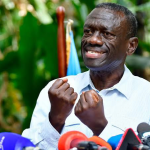Tanzania set to gain from Uganda’s groundbreaking electric bus plant

Tanzania is well-positioned to capitalise on the opportunity presented by East Africa’s first electric vehicle manufacturing plant in Uganda, as the country has a reliable power supply, and abundant deposits of iron, coal, and strategic minerals.
Tanzania is ideally situated to take advantage of the opening of East Africa’s first electric car manufacturing facility in Uganda, given the nation’s plentiful resources of critical minerals, coal, and iron as well as its steady power supply.
Tanzania is well-positioned to capitalise on the opportunity presented by East Africa’s first electric vehicle manufacturing plant in Uganda, as the country has a reliable power supply, and abundant deposits of iron, coal, and strategic minerals.
At the end of the year, Uganda is expected to launch its electric bus manufacturing plant, the first of its kind in East Africa.
The milestone has been globally lauded due to its significant reduction of carbon emissions, which adversely contribute to climate change, and the region’s transition to clean energy.
The world targets zero carbon emissions by 2050 by implementing different initiatives, including technological investment in the manufacture of electric vehicles.
Kiira Motors Corporation (KMC), a government entity based in Jinja, manufacture electric vehicles, believing that Tanzania has significant potential to benefit from its different aspects of the value chain due to power reliability and abundant resources such as iron, coal, and critical minerals.
Tanzania’s potential has increased after the Julius Nyerere Hydropower Project (JNHPP) commenced operations and the abundant mineral deposits that could provide strategic minerals such as nickel, copper, and cobalt, among others.
Strategic minerals are essential for manufacturing electric vehicle batteries, which KMC currently imports from China.
“We are the first in Africa to establish a factory manufacturing electric vehicles, providing an opportunity for all African countries to supply raw materials to us,” the KMC chief executive officer, Mr. Paul Musasizi, told a delegation of visiting Tanzanian journalists and the transport sector stakeholders on Thursday, August 15, 2024.
The delegation visited the factory, where they had an opportunity to learn about the factory’s operations and concluded that the state of the art was typical African and not Ugandan.
“The factory has so far made over 40 vehicles being used as upcountry and commuter buses. They are operating in Kampala, Entebbe, and Jinja as we expand the manufacturing capabilities,” he said.
He said $85 million, equivalent to Sh230.35 billion, had been invested since 2007, when the factory’s development plans commenced.







